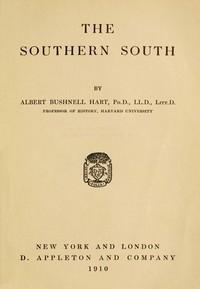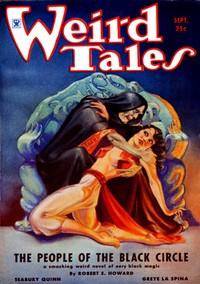|
|
Read this ebook for free! No credit card needed, absolutely nothing to pay.Words: 175438 in 31 pages
This is an ebook sharing website. You can read the uploaded ebooks for free here. No credit cards needed, nothing to pay. If you want to own a digital copy of the ebook, or want to read offline with your favorite ebook-reader, then you can choose to buy and download the ebook.

: The Southern South by Hart Albert Bushnell - United States Race relations; Southern States Social conditions@FreeBooksWed 07 Jun, 2023 INTRODUCTION 1 MAP AND TABLES 395 INDEX 419 THE SOUTHERN SOUTH INTRODUCTION The keynote to which intelligent spirits respond most quickly in the United States is Americanism; no nation is more conscious of its own existence and its importance in the universe, more interested in the greatness, the strength, the pride, the influence, and the future of the common country. Nevertheless, any observer passing through all the parts of the United States would discover that the Union is made up not only of many states but of several sections--an East, a Middle West, a Far West, and a South. Of these four regions the three which adhere most strongly to each other and have least consciousness of rivalry among themselves are often classed together as "The North," and they are set in rivalry against "The South," because of a tradition of opposing interests, commercial and political, which culminated in the Civil War of 1861, and is still felt on both sides of the line. That the South is now an integral and inseparable part of the Union is proved by a sense of a common blood, a common heritage, and a common purpose, which is as lively in the Southern as in the Northern part of the Union. The dominant English race stock is the same in both sections: in religion, in laws, in traditions, in expectation of the future, all sections of the United States are closer together than, for instance, the three components of the kingdom of Great Britain and Ireland. Whatever the divergence between Southerners and Northerners at home, once outside the limits of their common country they are alike; the Frenchman may see more difference between a Bavarian and a Prussian than between a Georgian and a Vermonter. It is not to the purpose of this book to describe those numerous common traits which belong to people in all sections of the United States, but to bring into relief some of the characteristics of the South which are not shared by the North. For it is certain that the physical and climatic conditions of the South are different from those of the North; and equally sure that as a community the South has certain temperamental peculiarities which affect its views of the world in general and also of its own problems. Slavery, which had little permanent effect on the society or institutions of those parts of the North in which it existed up to the Revolution, was for two centuries a large factor in Southern life, and has left many marks upon both white and negro races. The existence of a formerly servile race now ten millions strong still influences the whole development of the South. Unlike the North, which ever since the Civil War has felt disposed to consider itself the characteristic United States, the South looks upon itself, and is looked upon by its neighbors, as a unit within a larger unit; as set apart by its traditions, its history, and its commercial interests. The ex-president of the Southern Confederacy a few years ago at a public meeting declared that he appeared "In a defense of our Southland." A Southland there is, in the sense of a body of states which, while now yielding to none in loyalty to the Union and in participation in its great career, adhere together with such a sense of peculiar life and standards as is not to be found in any group of Northern communities except perhaps New England. The Northerner who addresses himself to these special conditions of the South must expect to be asked what claim he has to form or express a judgment upon his neighbors. The son of an Ohio abolitionist, accustomed from childhood to hear questions of slavery and of nationality discussed, I have for many years sought and accepted opportunities to learn something of these great problems at first hand. As a teacher I have come into contact with some of the brightest spirits of the South, and among former students count at least two of the foremost writers upon the subject--one a White and the other a Negro. For some years I have carried on an active correspondence with Southern people of every variety of sentiment. I have diligently read Southern newspapers and have been honored by their critical and sometimes unflattering attention. In the last twenty-five years I have made a dozen or more visits to various parts of the South ranging in length from a few days to four months, and therein have gained some personal acquaintance with the conditions of all the former slave-holding states except Missouri and Florida. In the winter of 1907-8 I took a journey of about a thousand miles through rural parts of the belt of states from Texas to North Carolina, with the special purpose of coming into closer personal touch with some phases of the problem upon which information was lacking. There need be no illusions as to the extent of the knowledge thus acquired. These various journeys and points of contact with Southern people have shown how large is the Southern problem, and how hard it is to discover all the factors which make the problem difficult. Every year opens out some new unexplored field which must be taken into account if one is to hope for anything like a comprehensive view of the subject. How shall any Northerner coming into a slave-holding region set his impressions alongside the experience of men who have lived all their lives in that environment? What is seven months' residence by a visitor, a fly on the wheel, against seventy years' residence by men who are a part of the problem? There are two sides to this question of the value of the observations of an outsider. Sometimes he is the only one who thinks investigation worth while; and too much caution in hazarding an opinion would put a stop to all criticism by anybody except the people criticised. The observer over the walls may see more than the dweller within. A Southerner coming up to make a study of the government in Massachusetts would probably discover queer things about the Street Department of Boston that escape the attention of those who breathe the city's dust; he might learn more about the conditions of mill towns like Fall River than the citizen of Boston has ever acquired; he might attend a town meeting in villages like Barnstable, into the like of which the Fall River man never so much as sets his foot; he may find out more about the county commissioners of Bristol County than was ever dreamed by the taxpayers of Barnstable; he may inform the dairyman on Cape Cod of the conditions of the tobacco farms on the Connecticut; and hear complaints from the factory hands of New Bedford which never reach their employers. It is just so in the South, where many people know intimately some one phase of the race problem, while few have thought out its details, or followed it from state to state. A professor in the University of Louisiana might tell more about the race and labor conditions of his State than the writer shall ever learn; but perhaps he could not contribute to knowledge of the Sea Islands of South Carolina or the Texas truck farms or the mountains of North Carolina. The privilege of the outside visitor to the South is to range far afield, to compare conditions in various states, and to make generalizations, subject to the criticism of better qualified investigators who may go over the same area of printed book and open country, but which have a basis of personal acquaintance with the region. Free books android app tbrJar TBR JAR Read Free books online gutenberg More posts by @FreeBooks
: The Articles of Faith A Series of Lectures on the Principal Doctrines of the Church of Jesus Christ of Latter-Day Saints by Talmage James E James Edward - Mormon Church Doctrines; Church of Jesus Christ of Latter-day Saints Doctrines Latter Day Saints@FreeBooksWed 07 Jun, 2023

: Cristina by Serao Matilde - Italian fiction; Short stories Italian IT Romanzi@FreeBooksWed 07 Jun, 2023

: The People of the Black Circle by Howard Robert E Robert Ervin - Fantasy fiction American; Conan (Fictitious character) Fiction Science Fiction@FreeBooksWed 07 Jun, 2023
|
Terms of Use Stock Market News! © gutenberg.org.in2025 All Rights reserved.






